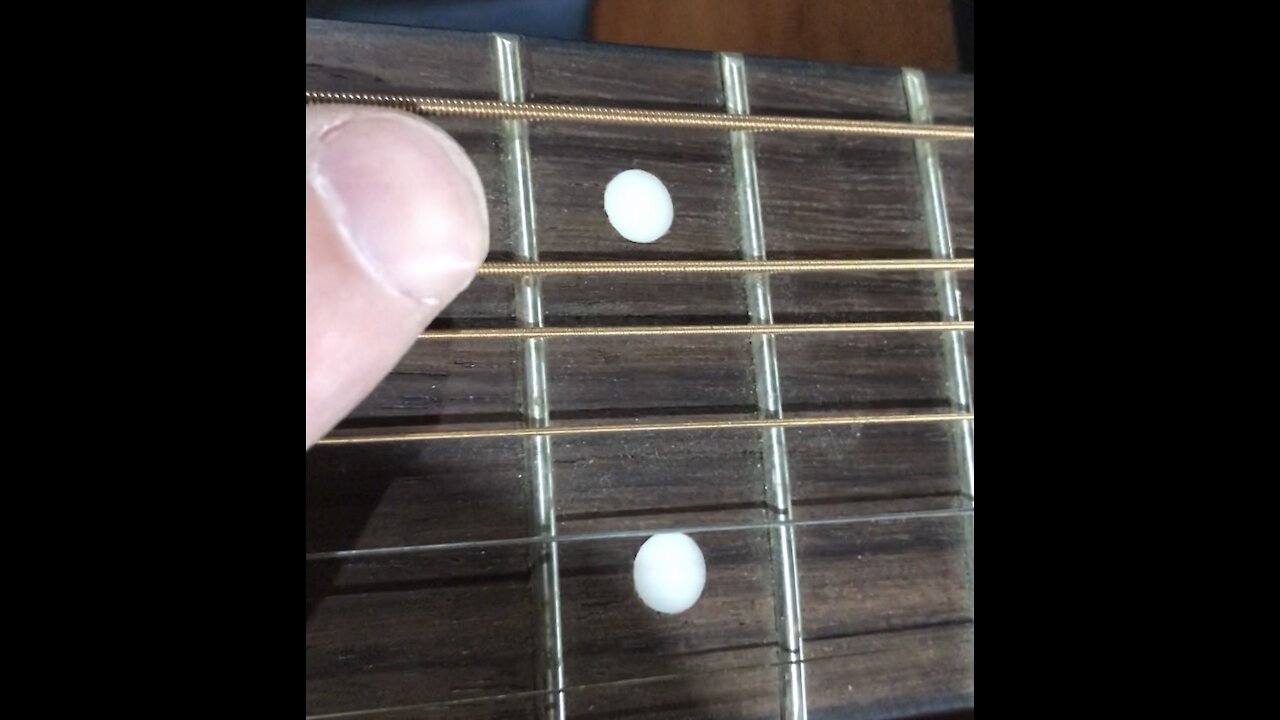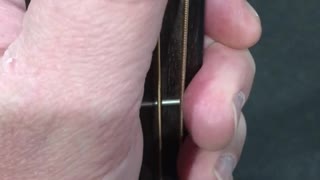Premium Only Content

Inspecting guitar teeth aka frets for string damage, and also horse teeth
In this video, we inspect the frets of a guitar for fret damage.
Its good to develop the good mental habit of expecting to find some damage, rather than the bad mental habit of expecting frets to be flawless.
Depending on what the previous owner did during practice, there will be uneven damage across all the frets.
Some frets will be flawless, while other frets are heavily damaged, and maybe just under one string. So you have to inspect every inch of every fret, especially the areas under every fret.
Why is this so important?
Because horse teeth.
The horse poster at the vets office says a horse will only live as long as his teeth, and not even one year longer...
Guitar frets are like horses teeth, in the sense that a guitar will only live as long as its frets, and not one note longer.
So when you do your fret inspections, get it straight from the horses mouth. Don’t assume the frets are in good shape.
Worn out frets are usually the death of an average, low-end student model guitar, because the cost of doing a fret repair job exceeds the value of the instrument.
Fret jobs are tedious, time consuming work thats usually done by a highly skilled guitar tech, or luthier, at full shop rate.
So unless your guitar is a collectors item, or has sentimental value, its usually better to spend your money upgrading your guitar, rather than “investing” a lot of money in a guitar that will probably not ever be worth it.
These worn out guitars do have some value, if they are donated to a student who wants to learn fret work on a low-risk job.
The guitar student can work on gathering tools and supplies they need for this project guitar,
and then spend 8 hours developing a feel for the tools and materials, so that they are better prepared mentally, physically, materially, technically...
One good way to work on fret maintenance skills, is to take a small scrap of brown paper bag. Wrap it like wrapping paper around a guitar pick, and use that as a tiny sanding block.
Use that sanding block to polish each fret to a mirror shine.
The abrasiveness of a paper bag is just about perfect for this job.
Its just abrasive enough where it can do the work and get the job done,
But not so abrasive, that if you accidentally take a few extra passes it will cause a problem.
(Some) fret wire is softer than you would think. Thats probably why most people just assume frets are ok, because they don’t think to check, they don’t have a reason to check...
Even normal everyday playing will leave dents, nicks, gouges, peening,
And these tiny, hand-made sanding blocks can clean up 95% of your fret problems.
And even if there is no string damage on the frets, the frets still usually need to be polished back to a mirror shine.
Fret material is so soft, that if you were to take a hardened metal tool such as a file and made one scratch in a fret, it may take you hours to polish that out...
So be careful with files.
Gentle hand, gentle touch.
If you are a student of guitar, at any level, from cradle to grave, you should make a plan to do a fret polish job on your guitar.
Pretty much every time you change strings, is a good time to think about polishing the frets.
Expect to spend 8 hours on the job. So plan it on a weekend, un-distracted...
That 8 hours will include, using old strings to tune up the guitar, and check for playability, and document 100 point check-list. Also, complete detail clean, includes checking all hardware for tightness. Polishing hardware, screws. Lifting pick-guard, and polishing inside and out. Cleaning switch and pots. Installing new strings, including gentle break-in stretching.
As you can see, planning an 8 hour job for a $50 guitar doesn’t make sense in guitar shop economics.
Guitar Shop rate is $60/hr, X 8 hours = $480
The guitar owner can simply upgrade to a much nicer guitar, for $480...
But for any guitar player who has never personally done a polish job on their own frets, they need to plan to do at least one fret polish job.
Its like learning to wash and wax your own car, by hand.
And then taking it to the car wash because you appreciate how much work it really is to wash and wax a car by hand.
So when you have your next guitar, you can take it to the local guitar shop and pay good money for fret service,
But then you are not paying the Guitar shop because you can’t do the work yourself, you are paying because you know all too well how much work it is, and therefore you highly value the work the guitar shop does, and you don’t mind paying $60/hour shop rate.
-
 2:46
2:46
Beginner Guitar
1 year agoA Song About The Day My Great Great Grandpa Died
473 -
 2:54
2:54
Sailwinds
3 years agoBoomerang 12 string guitar
51 -
 9:59
9:59
Bunker Guitars
3 years agoHow To Fix Worn Guitar Frets
1035 -
 9:35
9:35
Beginner Guitar
3 years agoInspecting a used guitar thats been converted to left handed
124 -
 4:22
4:22
sketchandjam
3 years agoA Bright New Day - Deering Banjo and 12 String Guitar
189 -
 4:39
4:39
sketchandjam
4 years agoThose Damn Skater Kids - 8 String Guitar Jam
561 -
 2:22
2:22
IOL-IndependentOnline
3 years agoViral video of allegedly drunk cop inspecting crash damage
642 -
 0:19
0:19
SassyAppys
4 years agoHorse gets her teeth cleaned
64 -
 7:13
7:13
ParacelsianRecords
4 years agoMGE 2020 #38 Triple Octave 8 String Guitar Experimental Ambient Melancholic Soundscape
9 -
 4:08
4:08
DonFoster
3 years ago $0.01 earnedblues guitar
1522